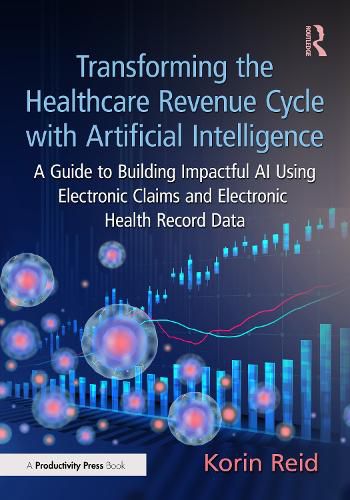Readings Newsletter
Become a Readings Member to make your shopping experience even easier.
Sign in or sign up for free!
You’re not far away from qualifying for FREE standard shipping within Australia
You’ve qualified for FREE standard shipping within Australia
The cart is loading…






Revenue cycle management (RCM) refers to an institution's financial management process that helps track, identify, collect, and manage incoming payments. This process helps businesses foster financial transparency within the company and charge patients the correct amount for the services they receive. But because of the unique healthcare payment system in the United States, relatively few of these dollars change hands directly between providers and their patients. Instead, there is a complex reimbursement system, mostly driven by third-party payment transactions between government programs and insurance companies, on the one hand, and healthcare providers, on the other.
Artificial intelligence (AI) can help predict claim denials by analyzing past denial trends and alerting health information management (HIM) professionals of potential denials in advance of billing. This affords an opportunity to review and correct claims pre-bill. One major benefit of AI in RCM is increased efficiency. By automating routine tasks, healthcare organizations can free up staff to focus on more important and value-added work. This can lead to improved productivity and faster turnaround times, ultimately resulting in improved patient care.
This book provides an informative blueprint to help hospital and healthcare revenue cycle administration personnel along their AI journey by using the most commonly available administrative datasets, electronic claims, and electronic health records. Peppered throughout the book are hilarious anecdotes and cautionary tales from the author's experience in building AI solutions in the healthcare space.
The book begins with an overview of key concepts such as data science, machine learning, AI, language models (e.g., ChatGPT), and more. The author expands on the defined process in the context of common revenue cycle use cases that leverage electronic claims and electronic health records. Finally, the book provides guidance on how to evaluate AI solutions at each point of the development process, including third-party vendor AI solutions.
$9.00 standard shipping within Australia
FREE standard shipping within Australia for orders over $100.00
Express & International shipping calculated at checkout
Stock availability can be subject to change without notice. We recommend calling the shop or contacting our online team to check availability of low stock items. Please see our Shopping Online page for more details.
Revenue cycle management (RCM) refers to an institution's financial management process that helps track, identify, collect, and manage incoming payments. This process helps businesses foster financial transparency within the company and charge patients the correct amount for the services they receive. But because of the unique healthcare payment system in the United States, relatively few of these dollars change hands directly between providers and their patients. Instead, there is a complex reimbursement system, mostly driven by third-party payment transactions between government programs and insurance companies, on the one hand, and healthcare providers, on the other.
Artificial intelligence (AI) can help predict claim denials by analyzing past denial trends and alerting health information management (HIM) professionals of potential denials in advance of billing. This affords an opportunity to review and correct claims pre-bill. One major benefit of AI in RCM is increased efficiency. By automating routine tasks, healthcare organizations can free up staff to focus on more important and value-added work. This can lead to improved productivity and faster turnaround times, ultimately resulting in improved patient care.
This book provides an informative blueprint to help hospital and healthcare revenue cycle administration personnel along their AI journey by using the most commonly available administrative datasets, electronic claims, and electronic health records. Peppered throughout the book are hilarious anecdotes and cautionary tales from the author's experience in building AI solutions in the healthcare space.
The book begins with an overview of key concepts such as data science, machine learning, AI, language models (e.g., ChatGPT), and more. The author expands on the defined process in the context of common revenue cycle use cases that leverage electronic claims and electronic health records. Finally, the book provides guidance on how to evaluate AI solutions at each point of the development process, including third-party vendor AI solutions.